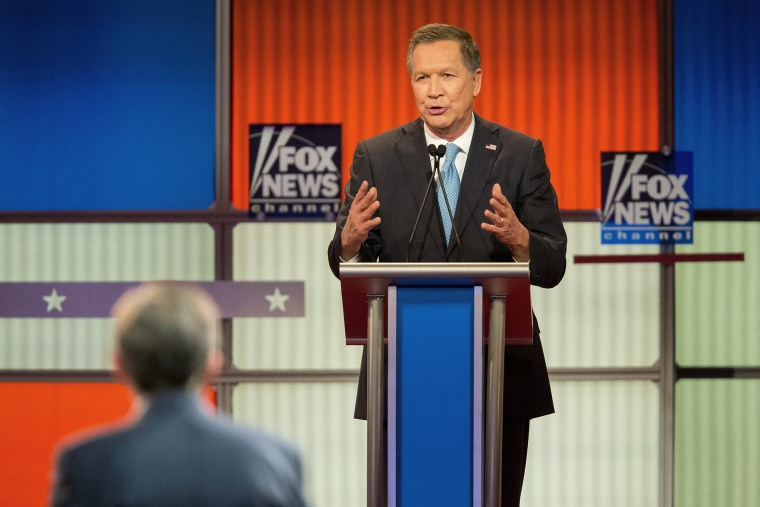A discussion during Thursday's Republican presidential debate about the growth of ISIS inside the country of Libya prompted a sharp remark from Ohio Gov. John Kasich, who told a Michigan debate hall that Hillary Clinton was to blame.
“Hillary Clinton worked aggressively to depose Muammar Gaddafi,” Kasich said during the Fox News Republican debate in Detroit, referring to Clinton’s time as secretary of state under President Obama.
“They pushed him out,” Kasich said of the Libyan leader. “Now we have a fertile ground for ISIS.”
Although Kasich is trailing in polls, his attack could have lasting power beyond his own candidacy. Should Clinton become the Democratic nominee, she will likely face questions about how to address the ISIS presence inside a country she helped to shake up. Libya is Clinton’s personal problem in a way that Iraq and Syria — where the American air campaign is currently focused — are not.
RELATED: Only the voters can judge Donald Trump’s horror show of a debate
Asked by moderators how he would address the problem, Kasich said that American troops may have to intervene inside Libya to take on ISIS there, a position that put him in agreement with Florida Sen. Marco Rubio. Whatever one thinks of American troops in Libya as a matter of policy, Kasich’s history lesson is not without merit.
A civil war in Libya flared at the outset of the so-called Arab Spring, leaving the White House to ponder intervening in order to protect the Libyan people. Clinton, along with then-U.N. ambassador Susan Rice and White House adviser Samantha Power, pushed for military action. A NATO-led air campaign began in the spring of 2011. In October of that year, Gaddafi was hunted down and killed by a rebel mob.
Since Gaddafi’s death, Libya has spiraled into further disarray. The country is now run by two rival governments and vast stretches of desert south of the coastline are home to terrorist organizations, including affiliates of ISIS.
Democrats appeared to have also realized this could be a problem for Clinton.
Vermont Sen. Bernie Sanders has brought up the war in Libya during debates, as well, accusing Clinton of being "too into regime change."
Maryland Gov. Martin O’Malley was even tougher on Clinton before he dropped out of the race last month. “I know Sec. Clinton was gleeful when Gaddafi was torn apart,” the former Democratic presidential candidate said during a debate in December.
Clinton has called the Libya war an exercise in smart power, noting that European allies had pleaded with the U.S. to intervene on behalf of the Libyan people. “We did not put one single American soldier on the ground in Libya,” Clinton said during a debate in October.
But now there are new questions about whether American soldiers are needed there — and not to free a population this time, but to battle a terrorist army.
